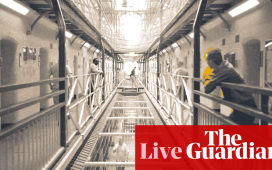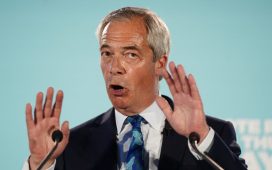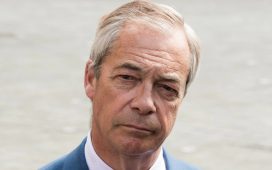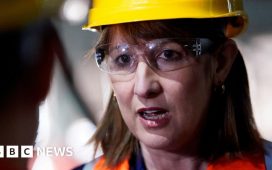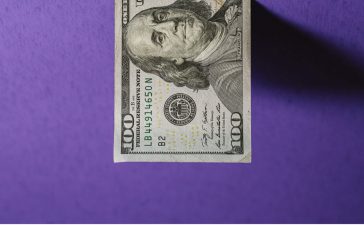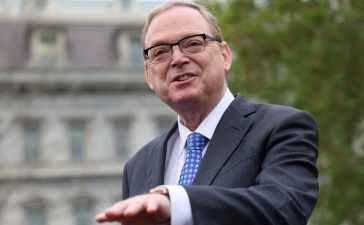Experts suggest US-UK trade deal won’t be as comprehensive as Trump claims
In his post on Truth Social Donald Trump said that trade deal with the UK would be “full and comprehensive”. (See 11.31am.)
But commentators and journalists who have been briefed on what to expect are suggesting it will be much more limited.
Speaking on the Today programme this morning, Jonathan Haskel, an economics professor and a former member of the Bank of England’s monetary policy committee, said:
People should remember that there’s a very big difference between trade deals and trade agreements.
Trade deals are limited and short-term and partial, just covering a few items. Trade agreements are broad based and long term.
Now, in his Truth Social post [the first one – see 6.59am] Mr Trump announced that this was a trade deal. So I’d urge people not to expect very much.
The Financial Times is reporting that “British officials acknowledge [the deal] will fall far short of the kind of comprehensive post-Brexit free trade agreement targeted by the past Conservative government”.
In its report on the trade deal, the New York Times says:
Timothy C. Brightbill, an international trade attorney at Wiley Rein, said the announcement would probably be “just an agreement to start the negotiations, identifying a framework of issues to be discussed in the coming months.”
“We suspect that tariff rates, nontariff barriers and digital trade are all on the list — and there are difficult issues to address on all of these,” he added.
This how Politico sums up what we are expecting.
This was never meant to be a comprehensive free trade agreement (FTA) with the U.S., of the sort that previous Tory governments tried and failed to win. Instead, this had been pitched by U.K. officials as a narrow economic pact to avoid tariffs and work together on AI and critical tech. How narrow or otherwise, we should know soon.
And Sky News is reporting that nothing will actually be signed today. It says:
No physical UK-US trade document will be signed today, Sky News understands.
That’s because the announcement from London and Washington is around what’s being described as the general terms of an agreement, rather than a full fat trade deal.
A big India-style agreement, this is not.
Key events
Bank of England governor Andrew Bailey says it’s ‘excellent’ to hear UK and US have agreed trade deal
At the Bank of England press conference, Andrew Bailey, the governor, said it was “excellent” news that the UK and the US have agreed a trade deal. But he said the UK economy would still be impacted by the effect of US tariffs on global trade.
He said the Bank had not been briefed on what was in the deal. But he said the Bank welcomed the news that a deal has been agreed. He went on:
We welcome that news. I very much welcome it, and I think it’s very well done to those involved. And the reason for saying that is that it will help to reduce uncertainty, and that’s important, as you’ll see in the context of what we’ve said today.
The UK is, though, a very open economy, so the UK is also affected by the way in which trade policy and tariffs affect, obviously, other economies – that is, in other words, the tariff measures that have been taken in respect of other economies.
I say that because I hope the UK agreement, if it is indeed announced this afternoon, will be the first of many. This will be good news all round, including for the UK economy.
But it is excellent, if it is indeed the case this afternoon, that the UK is leading the way. And I do congratulate both those in the UK who are involved, and those in the US too.
Graeme Wearden has full coverage of Bailey’s press conference on his business live blog.
Experts suggest US-UK trade deal won’t be as comprehensive as Trump claims
In his post on Truth Social Donald Trump said that trade deal with the UK would be “full and comprehensive”. (See 11.31am.)
But commentators and journalists who have been briefed on what to expect are suggesting it will be much more limited.
Speaking on the Today programme this morning, Jonathan Haskel, an economics professor and a former member of the Bank of England’s monetary policy committee, said:
People should remember that there’s a very big difference between trade deals and trade agreements.
Trade deals are limited and short-term and partial, just covering a few items. Trade agreements are broad based and long term.
Now, in his Truth Social post [the first one – see 6.59am] Mr Trump announced that this was a trade deal. So I’d urge people not to expect very much.
The Financial Times is reporting that “British officials acknowledge [the deal] will fall far short of the kind of comprehensive post-Brexit free trade agreement targeted by the past Conservative government”.
In its report on the trade deal, the New York Times says:
Timothy C. Brightbill, an international trade attorney at Wiley Rein, said the announcement would probably be “just an agreement to start the negotiations, identifying a framework of issues to be discussed in the coming months.”
“We suspect that tariff rates, nontariff barriers and digital trade are all on the list — and there are difficult issues to address on all of these,” he added.
This how Politico sums up what we are expecting.
This was never meant to be a comprehensive free trade agreement (FTA) with the U.S., of the sort that previous Tory governments tried and failed to win. Instead, this had been pitched by U.K. officials as a narrow economic pact to avoid tariffs and work together on AI and critical tech. How narrow or otherwise, we should know soon.
And Sky News is reporting that nothing will actually be signed today. It says:
No physical UK-US trade document will be signed today, Sky News understands.
That’s because the announcement from London and Washington is around what’s being described as the general terms of an agreement, rather than a full fat trade deal.
A big India-style agreement, this is not.
UK interest rates fall to 4.25% as Bank of England announces a quarter-point cut
Bank of England policymakers have cut interest rates by a quarter point to 4.25% to cushion the UK economy against the impact of Donald Trump’s trade war, Heather Stewart reports.
Graeme Wearden has more on this on his business live blog. He will be covering the Bank of England’s press conference starting at 12.30pm.
Here are some more pictures from the Service of Thanksgiving at Westminster Abbey to mark the 80th anniversary of VE Day.
Ministers say food standards have been ‘red line’ in trade talks with US
Ministers have insisted that food standards were a “red line” in the trade talks with the US.
During environment questions, in response to a question from the Lib Dem Tim Farron, Steve Reed, the environment secretary, said:
We have been crystal clear – we have red lines in this. We will not be allowing British farmers to be undercut on environmental or welfare standards in the way that the Conservatives did when they agreed a trade deal with Australia that undercut British farmers and caused immense damage to them.
And, during business questions, in response to a question from the Tory Mark Pritchard, the leader of the Commons, Lucy Powell, said:
[Pritchard] will be aware that the issues that he raises of food standards and agriculture have been red lines for this government in those trade talks, and he will get the details later today.
Labour should mutualise BBC, says thinktank
Labour is being urged to safeguard the future of the BBC by mutualising it. Under the plan, set out in a report from the leftwing thinktank Common Wealth, all UK residents would become “members” of the BBC, with a members council, selected by lot, helping to oversee how it is run.
Lisa Nandy, the culture secretary, spoke in favour of the mutualistion concept when she was an opposition MP and the thinktank hopes to persuade her to revive the idea. It says:
When the next BBC Royal Charter takes effect, interactive digital platforms and personalised streaming services will have replaced broadcasting as the central means by which we make sense of the world through news, entertainment and culture. The BBC will either take a leading role in this new media and communications landscape, or it will fade into irrelevance.
If the BBC is to survive and flourish it will need to become a new kind of institution, one in which the active and direct participation of citizens informs and invigorates the BBC’s public service mission. This is why we agree with Lisa Nandy that mutualisation is the right way forward for the BBC. Without it, the BBC faces a bleak future of dwindling audiences, collapsing funding and continued political interference.
Welcoming the report, the Labour MP Alex Sobel said:
Public control of the BBC through co-operative ownership is the most sustainable option for our national broadcasting service. It’s absolutely right that those who fund the BBC are given a substantial say in how their money is spent. That’s why launching a transparent system of public representation and participation to replace the top down-monolithic decision-making structure is long overdue.
Trump claims UK-US trade deal will be ‘full and comprehensive’
Donald Trump has posted a new message about the US-UK trade deal due to be announced this afternoon. In a post on his Truth Social network, he claims it will be “full and comprehensive” – despite experts saying that what is likely to be announced will be much more limited than the sort of full-spectrum trade agreement recently announced between the UK and India.
Trump also claims that it is a “great honour” to have the UK as the recipient of the first trade deal signed since he upended world trade by imposing global tariffs – prompting dozens of countries to head to the US offering deals that might persuade Trump to reduce the tariffs he had imposed on them.
Trump said:
The agreement with the United Kingdom is a full and comprehensive one that will cement the relationship between the United States and the United Kingdom for many years to come. Because of our long time history and allegiance together, it is a great honor to have the United Kingdom as our FIRST announcement. Many other deals, which are in serious stages of negotiation, to follow!
Lucy Powell issues unequivocal apology for ‘dog whistle’ comment about grooming gangs
Lucy Powell, the leader of the Commons, has given an unequivocal apology for appearing to suggest that politicians raise concerns about grooming gangs as a “dog whistle”.
Speaking in the Commons this morning, she went further than she did at the weekend when she issued a statement that she said was intended to “clarify” what she meant, adding that she was “sorry if this was unclear”.
Powell was on the Radio 4’s Any Questions at the end of last week when a fellow panellist, the Reform UK- supporting commentator Tim Montgomerie, started talking about grooming gangs. Powell replied:
Oh, we want to blow that little trumpet now, do we? Yeah, OK, let’s get that dog whistle out.
The phrase “dog whistle” is used in politics to refer to language that contains hidden meaning for a particular audience – normally in a way that signifies support for racist views, without that being explicit.
During business questions, Jesse Norman, the shadow leader of the Commons said that Powell’s comment was “indefensible” and that her statement at the weekend “conspicuously did not contain an apology”.
In response, Powell thanked Normal for raising this issue and said she wanted to be “absolutely clear” in her message to MPs, and also to victims and survivors of abuse. She went on:
I am very sorry for those remarks, as I made clear over the weekend.
I and every member of this government want your truth to be heard wherever that truth leads. Your truly appalling experiences need to be acted on, for those responsible to be accountable and face the full force of the law and for justice to be served.
I would never want to leave the impression that these very serious, profound and far-reaching issues, which I have campaigned on for many years, should be shied away from and not aired. Far from it. No stone will be left unturned.
And what the victims want first and foremost is for actions to be taken and for the many, many recommendations from the previous inquiry to be implemented in full, including mandatory reporting of child sexual abuse – something I have called for for nearly a decade. Shockingly, these recommendations remain sitting on the shelf until we came into government last year.
Osborne right to say Badenoch has no ‘credible economic plan’, says Labour
George Osborne is right, according to the Labour party. Or at least right about Kemi Badenoch. Labour has put out a press statement highlighting comments from the former Tory chancellor in an interview with Andrew Marr on LBC last night. Speaking about Badenoch, Osborne said:
I think it’s certainly the case that Kemi Badenoch made a reputation for herself and speaks very effectively and with passion on culture war issues, transgender rights and the like.
But that’s what helps you be the rising star. I don’t think it sustains you as a risen star. I think to be the leader of the opposition, you have to be someone who offers the country a credible economic plan. And there is a bit of a gap in the market. No one at the moment has got a plan that certainly has convinced the public is going to grow the British economy.’
Commenting on the interview, a Labour party spokesperson said:
George Osborne says out loud what other Tories are thinking: Kemi Badenoch’s Conservative party has no plan for our country. She is more concerned about fighting with Nigel Farage than fighting for working people.
Osborne also made it clear that he does not think Keir Starmer has persuaded the public Labour has a credible economic plan for the country either. But presumably Labour HQ does not agree with him about that.
There will be a ministerial statement in the Commons this afternoon on the US-UK trade deal, Lindsay Hoyle, the Speaker, told MPs at the start of business questions. But he said he did not know yet when this would be.
Steve Reed accuses Tories of weaponising tragedy after they claim farmers taking their lives due to inheritance tax
Steve Reed, the environment secretary, has accused the opposition of trying to “weaponise” tragedy after his Tory opposite number claimed farmers are taking their lives because of Labour’s inheritance tax policy.
The government announced in the budget last year that more valuable farms will lose their exemption from inheritance tax. Older farmer have complained that, having planned on the basis that they will be able to leave their farms to their children without an inheritance tax liability, they have had little time to make alternative arrangements before the tax change comes into force in April next year.
Speaking during environment questions in the Commons, Victoria Atkins, the shadow environment secretary, said:
Before Christmas, I warned the secretary of state that a farmer had taken their own life because they were so worried about the family farm tax. He responded with anger and later stopped the farming resilience fund, which helped farmers with mental ill health.
This week, I have received the devastating news that several more farmers have taken their own lives because of the family farm tax. This is the secretary of state’s legacy, but he can change it, because it is not yet law.
Will he set out these tragedies to the prime minister, demand that Labour policy is changed, or offer an appointed principal his resignation?
In his reply, Reed said he was sorry that Atkins was seeking “to politicise personal tragedy in this way”. He went on:
I think it’s immensely, immensely regrettable that she would seek to do that. None of us have been sure what happens in matters of personal tragedy. But I think it’s beneath her, actually, to try to weaponise it in a way that she has done this.
This government takes the issues of mental health very, very seriously indeed. That is why we are setting up mental health hubs in every community so that we can support farmers and others who are suffering from mental health, which I would again remind her is a problem that escalated during her time in office the secretary of state for health, where she failed to address the problems people are facing.
Starmer says UK will get ‘defence dividend’ from government’s decision to boost MoD spending
Keir Starmer used his speech to the London Defence Conference to announce a £563m contract for Rolls-Royce for the maintenance of Britain’s fleet of Typhoon fighter jets. “The work to maintain 130 Typhoon engines will take place at Rolls-Royce’s sites, supporting hundreds of jobs in Bristol and beyond,” No 10 said.
He also said that British workers would gain from what he described as the “defence dividend” – the benefits to be had from the government’s decision to increase defence spending. Starmer said:
Our task now is to seize the defence dividend – felt directly in the pockets of working people, rebuilding our industrial base and creating the jobs of the future.
A national effort. A time for the state, business and society to join hands, in pursuit of the security of the nation and the prosperity of its people.
An investment in peace, but also an investment in British pride and the British people to build a nation that, once again, lives up to the promises made to the generation who fought for our values, our freedom and our security.
The phrase “defence dividend” is an allusion to the term “peace dividend” – which referred to the advantage Britain and other western countries gained at the end of the cold war when they could cut defence spending, meaning more government money was available for other priorities.
What Starmer refers to as the “defence dividend” has been funded in part by huge cuts to aid spending. But Starmer has repeatedly sought to show that his policy will bring, not just defence gains, but employment gains too.
Starmer says acting in national interest has been priority in trade talks with US
Keir Starmer has said that acting in the national interest has been his priority in the talks on the UK-US trade deal expected to be announced later.
Speaking to the London Defence Conference, Starmer:
Talks with the US have been ongoing and you’ll hear more from me about that later today.
But make no mistake, I will always act in our national interest, for workers, businesses and families, to deliver security and renewal for our country.
The conventional wisdom at Westminster is that trade deals are a good thing, and that voters welcome them. But the US-UK deal could challenge this assumption because at least some of its features may look like protection racket payments handed over to an administration using tariffs as an instrument of extortion.
In a post on social media, Robert Peston, ITV’s political editor, says British voters might not necessarily applaud what has been agreed.
The UK’s soon-to-be announced tariff deal with the US matters hugely for two reasons.
First, it is the first since Trump announced his coercive global tariffs on the whole world. So it will be a template for further such deals with bigger manufacturing nations and areas like Japan and the EU.
Second, it can only be judged against the yardstick of how far the UK has been forced to grant the US better terms of trade in response to the American president’s gangsterish bullying.
The prospect of the UK being seen as a net winner from a deal that would abuse the meaning of “free trade” is nil.
The question, soon to be answered, is how far we have surrendered – on access to the UK for US farmers, on reducing the tax for the likes of Google and Amazon – to save the bacon of our motor and steel manufacturers.
Politically in the UK for the prime minister I am not sure how it will play out. British voters don’t like Trump. They won’t want Starmer to have capitulated to him.
Green party joins Lib Dems in saying MPs must get vote on US-UK trade deal
The Green party is joining the Liberal Democrats (see 8.05am) in demanding that MPs get a vote on the proposed US-UK trade deal (as well as the UK-India one). The Green MP Ellie Chowns posted this on Bluesky.
Reports that Labour may scrap the Digital Services Tax to secure a trade deal with Trump are deeply concerning. I’m urging the govt to guarantee MPs get a vote on any such deal. MPs must have a say in decisions that affect our digital economy and ability to tax corporate giants.
In 2021 the Labour party published a policy paper saying it would give MPs a vote on trade deals. It said:
We will reform the parliamentary scrutiny of trade agreements, so that MPs have a guaranteed right to debate the proposed negotiating objectives for future trade deals, and a guaranteed vote on the resulting agreements, with sufficient time set aside for detailed scrutiny both of the draft treaty texts, and of accompanying expert analysis on the full range of implications, including for workers’ rights.
In the Commons, Ed Davey, the Lib Dem leader, has repeatedly pressed Keir Starmer to confirm that he will give MPs a vote on the proposed US-UK trade deal. But Starmer has refused to commit to this. When this last come up, he told Davey: “If [a deal] is secured, it will go through the known procedures for this house.”
This was a reference to the CRAG (Constitutional Reform and Governance Act 2010) process – which does not guarantee MPs get to vote on treaties.
Unlike Donald Trump, Keir Starmer does not have his own social media platform. He still uses X, and this morning he has been tweeting, not about the US-UK trade deal, but about the 80th anniversary of VE Day.
Their victory will always be one of our finest hours.
Today we come together to celebrate those who fought for our freedom.
#VEDay80
He has also posted a link to an article he has written for the Metro about the VE Day generation, and his own grandfather. Here is an extract.
This is the thing about our greatest generation.
Not only did they sacrifice so much, they often bore their burden in silence.
I think of my own grandfather, who fought during the Second World War. We never did find out exactly what he saw. He simply didn’t want to talk about it.
But this VE Day and every VE Day, we must talk about them. Because without their bravery, the freedom and joy of today’s celebrations may never have come to pass.
Agenda for the day

Andrew Sparrow
Good morning. I’m Andrew Sparrow, picking up from Martin Belam.
Here is a timetable for what we are expecting today. We will be mostly focused on the US-UK trade deal announcement, but there will be some other politics too.
9am: Keir Starmer gives a speech at the London defence conference. He is not expected to take questions.
9.30am: Steve Reed, the environment secretary, takes questions in the Commons.
10.30am: Lucy Powell, the leader of the Commons, takes questions on next week’s Commons business.
11.30am: Downing Street holds a lobby briefing.
Noon: Starmer and other political leaders join the king and queen in Westminster Abbey for the service to commemorate the 80th anniversary of VE Day.
After 12pm: After the two minutes’ silence to commemorate the 80th anniversary of VE Day, the Bank of England announces its interest rate.
After 12pm: John Swinney, Scotland’s first minister, takes questions from MSPs.
3pm (UK time): Donald Trump is due to make his announcement in the White House about the US-UK trade deal. He posted this on his Truth Social account earlier.
Afternoon: Starmer is expected to make a statement about the trade deal.
Defence secretary John Healey has just appeared on the BBC Radio 4 Today programme, where he did not have much to add to his earlier comments about the prospect of a UK-US trade deal, repeating that negotiations had been “hard” and that ministers had refrained from offering a running commentary in order to give negotiators space.
He was asked whether ministerial silence on some of the more controversial things Donald Trump’s administration had said or done since coming to office was part of the UK trying to secure a trade deal, and also asked why it did not appear to be “a full deal, as opposed to something responding to tariffs, as it seems to be.”
Healey essentially side-stepped those questions, saying “the single purpose of the government is to get a good economic deal. And this discussion reminds us that the US is an indispensable ally for our economic security and our national security.”


